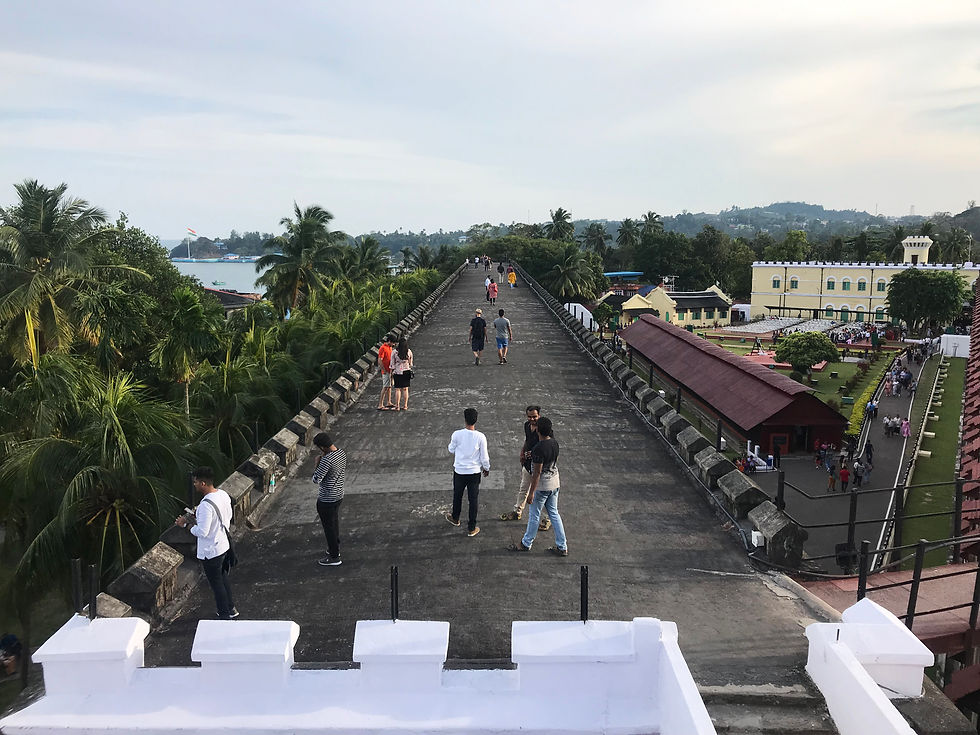Oceans Away
- sydneyrswitzer
- Feb 3, 2019
- 3 min read

Last Friday night I stood in a small cluster around a table with 28 Jewish young adults from Mumbai. With our arms around each other we sang through the four verses of Shalom Aleichem, repeating each verse three times. We made our way through the Shabbat service, me explaining each part of the service and my friend Eli leading the prayers in the traditional Bene Israeli tune. We ate challah and drank wine, and lit Shabbat candles together, just like we do at home.

The 29 of us were attending Youth Camp - a five day retreat to the Andaman Islands providing a space for young Jews to get to know each other and get to know themselves. Throughout the camp we did all sorts of activities, from scuba diving to long walks on the beach to visiting a historic British jail. I was there to lead sessions - to facilitate experiences and conversations and help work through the more programmatic aspects of camp.

Andaman was nice. It was tropical, and the water was a clear blue, contrasting with the murky waters of Mumbai. I swam for hours, surrounded by ocean and luscious green forests and soft white sand. But the highlight of Andaman for me was not the nature but the experience of seeing a totally different part of India.

The Andaman and Nicobar Islands are actually a collection of 572 islands, geographically closer to Thailand, Indonesia and Myanmar than to mainland India. The local populations are primarily tribal, and many of the islands are off-limits to visitors (even Indian visitors) in order to preserve the tribal lifestyles.

We visited Radhanagar Beach, voted Asia’s best beach in 2004. It was a bit crowded for my liking, but further down it was relatively quiet. We came late in the afternoon, and the sun set over us as we swam. Many people in India don’t learn how to swim as children, especially to a level where they’re comfortable in deep ocean. While I definitely don’t consider myself such a strong swimmer, I was one of the only swimmers in the group.

Further out I was alone as the waves rolled over me, not yet broken, just falling up and down from the horizon. The blue of the late afternoon sky melded with the sunset reflections on the surface of the water. I felt disoriented - like this was the country I know and the religion that I know, but here, so far from Mumbai, and so far from home, it was different, unfamiliar. But the sense of disorientation wasn’t scary, it was exciting, like I was learning more about India and about Judaism through the differences.

During Friday night services I had been asked to lead the Eshet Chayil prayer. Eshet Chayil is an acrostic poem praising the many characteristic traits of Jewish womanhood. From keeping her family fed to weaving luxurious fabrics, the prayer, which is sometimes interpreted as sexist and outdated, can also be seen as a tribute to the many gifts contributed by Jewish women throughout history.

Following the recitation of the traditional Eshet Chayil, I presented a contemporary English version of the prayer, listing various self-affirmations for today’s Jewish women. There were 14 verses, and each verse was read out loud by one of the 14 female participants in the group. Usually I take such generalized statements of idealized mindfulness with a grain of salt, but hearing these words said out loud and in solidarity by my fellow Jewish women was really very special.

So often we hear about Jewish women being marginalized in Jewish tradition, or made to feel unwelcome or uninvolved because of their affiliation. Even more so in India, where the position of women is so different from in Canada. It was very nice for me to be a part of a group of Jewish women, some quite observant and some less, some Indian and some (one) Canadian, but all sharing in our little piece of observing Shabbat together.

And so we came back to Mumbai. After five days of making friends and sun fun and talking Jewish, we made our way back to normal life. I thought back on how many groups like this I’ve been a part of, how many Birthright trips and Shabbatons and summer camps and groups of young Jews doing Jewish things, and I felt so grateful for all of these opportunities I’ve had.

But more than that I felt grateful for how warmly this amazing community has welcomed me into their midst. I think back to my last Youth Camp, last January, and how much has changed since then, how much more I feel that this community is becoming my home. And I left feeling comforted that all around the world, Judaism is alive and well, and Jewish communities are fostering their Jewish futures.








*These photos were taken on my phone as I didn't bring my camera with me, so please excuse the resolution!



















